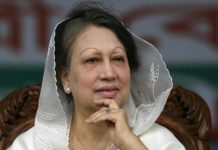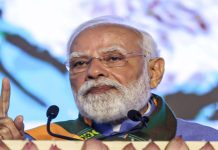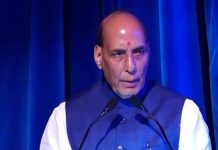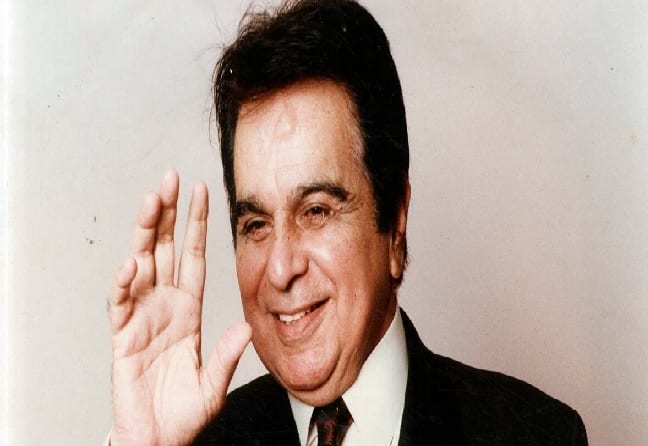Mumbai (Maharashtra): Bollywood’s tragedy king Dilip Kumar breathed his last on Wednesday at Mumbai’s PD Hinduja Hospital. The 98-year-old actor passed away due to various age-related ailments.
The multiple-award-winning actor’s career spanned over more than five decades and during the golden era of Hindi cinema, Dilip Kumar charmed millions of hearts with his performance in more than 65 films.
All you need to know about him
He was also popularly known as the First Khan of Bollywood. Born as Muhammad Yusuf Khan in Peshawar, Pakistan, he began his acting career with the screen name, Dilip Kumar.
Dilip Kumar holds the record for winning the maximum number of Filmfare awards. He was the inaugural recipient of the award and won the best actor Filmfare Award eight times. In his five-decade-long career, he contributed to Hindi cinema in different ways, including the introduction of the method acting technique.
His first few films, including his Bollywood debut ‘Jwar Bhata’, which was released in 1944, could not strike a chord with the audiences. But his scintillating performance in ‘Jugnu’ in the year of Indian Independence, 1947, won hearts, making the film his first major hit.
Born on December 11, 1922, Dilip Kumar was one among 12 siblings. The yesteryear actor completed his schooling from the Barnes School, Deolali, Nashik, where he grew up in a mixed neighbourhood. His childhood friend Raj Kapoor, too, later became his colleague in the film industry.
After running a sandwich stall at Pune’s Army Club in 1943, Dilip Kumar wanted to establish a business in Mumbai to contribute to the household income and help his father. His father was a fruit merchant and a landlord who owned orchards in Peshawar and Deolali near Nashik. But fate had other plans: at the Churchgate Station in Mumbai, Dilip Kumar met Dr Masani, who introduced him to actor Devika Rani, then owner of the renowned film studio in Malad, Bombay Talkies, which has now been shut down.
Earlier, Dilip Kumar used to help in the scripting and story-writing department because of his proficiency in the Urdu language. It was upon Devika Rani’s request that Muhammed Yusuf Khan changed his professional name to Dilip Kumar. He then embarked on his acting career with Bombay Talkies in the movie ‘Jwar Bhata.’
In his autobiography ‘The Substance and the Shadow’, he recalled, “I had no clue what acting in front of a camera was. It was something to be studied, learned, and practised.”
During his stint at Bombay Talkies, he met actor Ashok Kumar, who was a star back then. From Ashok Kumar, he learnt that acting was not about being theatrically bombastic, which was the popular trend in those times.
After ‘Jugnu’, he starred in a couple of more hits — ‘Shaheed’ and ‘Mela’– before finally landing his breakthrough role in Mehboob Khan’s ‘Andaz’.
The actor was known for his careful selection of scripts and it was evident why Dilip Kumar was more than just an actor, writer, filmmaker, poet, or philosopher. His erudition helped him to stand out and evolve a new method of acting. The dignified silences, the thoughtful pauses, and his poetic dialogue delivery were hallmarks of his understated style.
The 1949 film ‘Andaz’ saw Dilip Kumar, starring alongside two other golden stars of that era – Raj Kapoor and Nargis.
Although he had some major hits in the 1940s, it was in the 1950s that he tasted real success for the first time with a string of hits: ‘Babul,’ ‘Devdas,’ ‘Hulchul,’ ‘Yahudi,’ ‘Daag,’ ‘Sairat,’ ‘Naya Daur,’ and ‘Deedar’. These were the classic tragedy films that gave Dilip Kumar the title of ‘The Tragedy King.’
Though he was a teetotaller himself, in ‘Devdas’ he captured the essence of the self-destructive man driven by unrequited love to become a drunkard. He portrayed the grief of his character Devdas, through his hazy eyes and eloquent silences.
It was the social drama ‘Daag’ that won the legendary star his first ever Filmfare Award in the main category of the lead actor, also making him the inaugural recipient of the award at the time of its inception in 1954.
After that, he won the prestigious award several times and till date continues to hold the record for the maximum Filmfare wins with his eight Black Lady trophies. He shared the position with superstar Shah Rukh Khan who also has eight Filmfare Awards to his credit.
Though tragedy movies brought him great success on the professional front, Dilip Kumar got so involved in the characters he portrayed that it affected his mental health giving him bouts of depression.
After that, on the suggestion of a psychiatrist, he went on to do a few light-hearted roles. He started with Mehboob Khan’s ‘Aan’, which was also his first film shot in technicolour.
Though the actor tried to work in different genres to do away with the tag of ‘The Tragedy King’, his epic portrayals in these films have been so etched in the minds of his fans that he is to date remembered with this title only.
He played several lighter roles before finally landing the lead role of Prince Salim in the big-budget magnum opus ‘Mughal-e-Azam’ in 1960 which went on to be re-released in the full colour format in 2004, 44 years after its original release.
In 1961, the late actor also became a film producer, bankrolling and starring in the film ‘Ganga Jamuna’ alongside actor Vyjayanthimala, though he did not produce any other film thereafter. The movie, which itself had elements borrowed from ‘Mother India’, later became the precursor for several other films, where one brother becomes an outlaw and the other is a policeman.
Dilip Kumar excelled in his performance as a rustic villager who was forced to become a dacoit due to circumstances. Made in rural dialect, the film retained those flavours in its music and lyrics.
He delivered a few more terrific portrayals in the 1960s, which include his dual role in ‘Ram Aur Shyam,’ Waheeda Rehman starrer ‘Aadmi,’ and superhit flick ‘Sunghursh’, in which he again starred opposite Vyjayanthimala.
The year 1966 marked the legendary actor’s marriage with the then Bollywood diva Saira Banu who was 22 years younger than him. Before marrying Saira Banu, Dilip Kumar had been in a relationship with the queen of elegance Madhubala. He was also linked with Bollywood beauties like Kamini Kaushal and Vyjayanthimala.











































